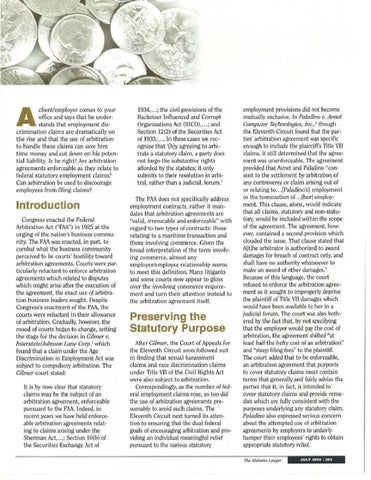cllenVemploytr comes to your office and says that he understands that employment dis路 crimination claims are dmmatiClllly on the rise and lhlll Ihe use of arbitration to handle Ihest claims can save him timt money and cui down on his polenlililliability. Is he right ? Are arbitration agreements enforceable as they relate to federal $tlltulory t mploymcnt claims? Can arbitration be used to discourage employees (rom filing claims?
A
Introduction Congress en.,cted the Federal Arbitration Act ("t'M") in 1925 at the urging of the nation's business community. The FAA was enacted, in part, to combat what the busioeS$ community ptrct:ived to bt courts' hostility tov.'Ard arbitration agreements. Courts were particularly reluclllnt to enforce arbitration agreemenlJ which related to disputes which might arise after the execution of the agreement. the exact use of arbitration business leaders sought. [)espite Congress's enactment of the FAA, the courts were reluctant in their Allowance of arbitration, Cradually. however. the mood of COLlrts began to change, settin(l the stOige for the dcci$ion in Cl/mer !l, Illlerslule/Johnson I-<IIle Com,' which found tilat a claim under the Aile Discrimination in Employment Act WlL'i subject to compulsory arbitration, The Gilmer court stated: It is by now clelr that statutory claims may be the subject of an arbitration agreemtnt, enforceable pUl1uant to the FAA, Indted, in recent yeal1 we have held enforceable arbitration agreemenu relating to claims arising under the Sherman Act.... ; Sec:tlon lO(b) of Ihe Securities Exchange Act 0(
1934 " .,; the civil provisions of the Racketeer Innuenctd and Corrupt Organizations Act (RiCO) .... ; IItId Section 12(2) of the Securities Act of 1933,,,,, In these cases we recognize that '[bly agreeing to arbitrate a statutory claim, a l);11ty does not forgo the substantive righls afforded by the statutes: it only submits to their resolution in arbitral. rather than a judicial , forum .' The FAA does not specifically address employmtnt conlract.!, rather it mllndates that arbitration agreemenls are "valid, Irrevocable and enforceable" with regard to two types of COlllractJ: those relating to a maritime transaction and those involving commerce. Given the brood interpretation cJ the term in'lOlv路 ing commerce, almost any employer/employee re'ationship seems to meet this definition Many litigants and some courts now ~ppear to IIloss over the involving commerce requirement and lum their attention instead to the arbitration IIgreement iuelf,
Preserving the Statutory Purpose After Gilmer, the Court of Appeals for the Eleventh Circuit soon follOWed suit in nndlng thllt sexual hllraumenl claims and race discrimination claims under Title VII of the Civil Rights Act were also subject to arbitration. Correspondingly, M the number of federal employment claims rose. so too did the use of arbitration agreements pre路 sumably to awid such claims, The Eleventh Circuit IlCJIt turned its allention to eNuring that the dual frocral goals of encourllging arbittlltion and providing an individual meaningful relief pUl1uant to the various statutory
emplO)'lT'lCnt prQ\lisions did not become mutually exclusive, In Paladino v. Aunel Compuler 1khlU)/ogl(!s. Inc" I though the E1Mnth Circuit found Ihatthe parties' arbitration agreement WI!! specific enough to include tile plaintifrs Title VII claims. it still determIned that the agreement Wall unenforceable, The agreement prOVided Ihat Avnet and ]'aladino "oonsent to the settlement by ilrbitration of any controvtrsy or claim arising out of or relating to",[Paladino's [ employment or the termination of. , .Iher[ employment. This clause, alone, would Indicate that all claims, statutory and non-statutory. would be included within the scope of the agreement. The agreement. however, contained a second prO'lision which clouded the iuue, That clause stated that Altlht arbitrator is authorized to award damages (or breach of contract ooly, and shall have no authority whatsofYer to make an award of other dal1\llges.~ Because of this language. the court refused to enforce the arbitration agreement as it sought to improperly deprive tile plaintiff of Title VII damagu which would have been lwailable to her in a judicial forum, The court was also bothered by the fact Ihat, by not specifying that the employer would pay the cost of arbilration, the a(lreement shifted "at least half the hefty cost of an arbitration" and "steep filing fees" to the plaintiff. The court added that to Ix: (:I'Ifol'cellblc. an arbitration agreement that purports to cover statutory claims must contain terms that generally and fairly advise the parties that it, in fact, is intended to cO\ler statutory claims and provide remedies which are fully consistent with the PUrp0$C5 underlying any statutory claim, PaludlnQ also txpres.sed $erioU$ concern about the attempted use of arbitration agrtemenlS by employel1to unfairly hamper their employtes' rights to obtain appropriate statutory relief, ~UlY
1000
2M
